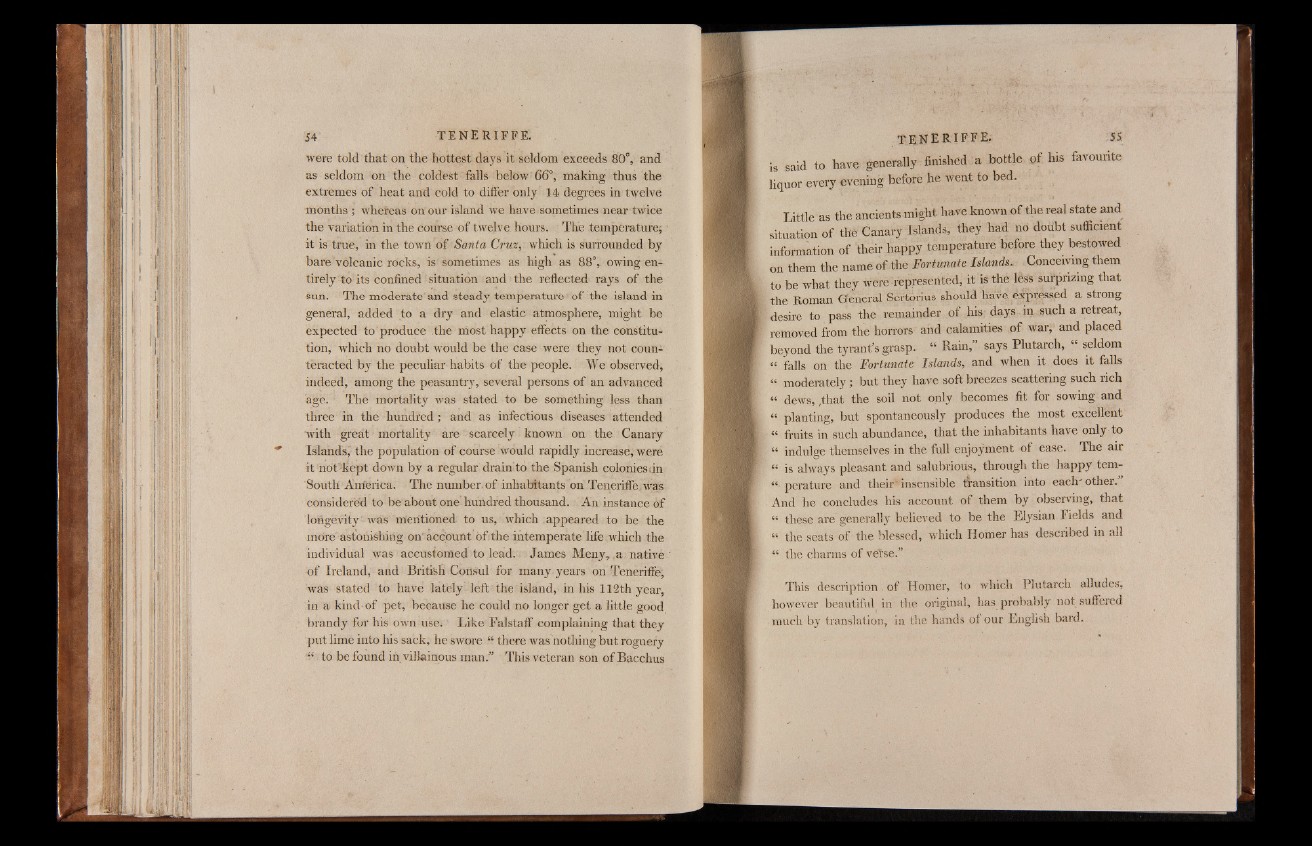
were told that on the hottest days it seldom exceeds 80°, and
as seldom on the coldest falls below 66°, making thus the
extremes of heat and cold to differ only 14 degrees in twelve
months ; whereas on our island we have sometimes near twice
the variation in the course of twelve hours. The temperature;
it is true, in the town o f Santa Cruz, which is surrounded by
bare volcanic rocks, is sometimes as high as 88°, owing entirely
to its confined situation and the reflected rays of the
sun. The moderate and steady temperature of the island in
genera], added to a dry and elastic atmosphere, might be
expected to'produce the most happy effects on the constitution,
which no doubt wrould be the case were they not counteracted
by the peculiar habits of the people. We observed,
indeed, among the peasantry, several persons of an advanced
age. The mortality was stated to be something less than
three in the hundred; and as infectious diseases attended
with great mortality a r e ' scarcely known on the Canary
Islands, the population of course would rapidly increase, were
it not'kept down by a regular draini to the Spanish coloniesrin
South Anferica. The number, of inhabitants on Teneriffe .was
considered to be about one hundred thousand. An instance of
longevity-was mentioned to us, which appeared to be the
more astonishing on’account of the intemperate life which the
individual was accustomed to lead. James Meny,,a native
of Ireland, and British Consul for many years on Teneriffe,
was stated to have lately left the island, in his 112th year,
in a kind of pet, because he could no longer get a little good
brandy for his own use; Like Falstaff complaining that they
put lime into his sack, he swore “ there was nothing but roguery
to be found in villainous man.” This veteran son of Bacchus
is said to have generally f i n i s h e d : a bottle pf his favourite
liquor every evening before he went to bed.
Little as the ancients might have known of the real state and
situation of thé Canary Islands, they had no doübt sufficient
information of their happy temperature before they bestowed
on them the name of the Fortunate Islands. Conceiving them
to be what they were -represented, it is the lëss surprizing that
the Roman General Séftorius should have, expressed a strong
desire to pass the remainder o f his. days in such a retreat,
removed from the horrors and calamities of war; and placed
beyond the tyrant’s grasp. | Rain,” says Plutarch, « seldom
“ falls on the Fortunate Islands, and when it does it falls
“ moderately ; but they have soft breezes scattering such rich
“ dews, ,that the soil not only becomes fit for sowing and
“ planting, but spontaneously produces the most excellent
1| fruits in such abundance, that the inhabitants have only to
I indulge themselves in the full enjoÿmènt of ease. The air
“ is always pleasant and salubrious, through the happy tem-
“• perature and their* insensible transition into each'other.”
And he concludes his account of them by observing, that
“ these are generally believed to be the Elysian Fields and
“ the seats of the blessed, which Homer has described in all
“ the charms of verse.”
This description . of Homer, to which Plutarch alludes,
however beautiful in the original, has probably not suffered
much by translation, in the hands of our English bard.